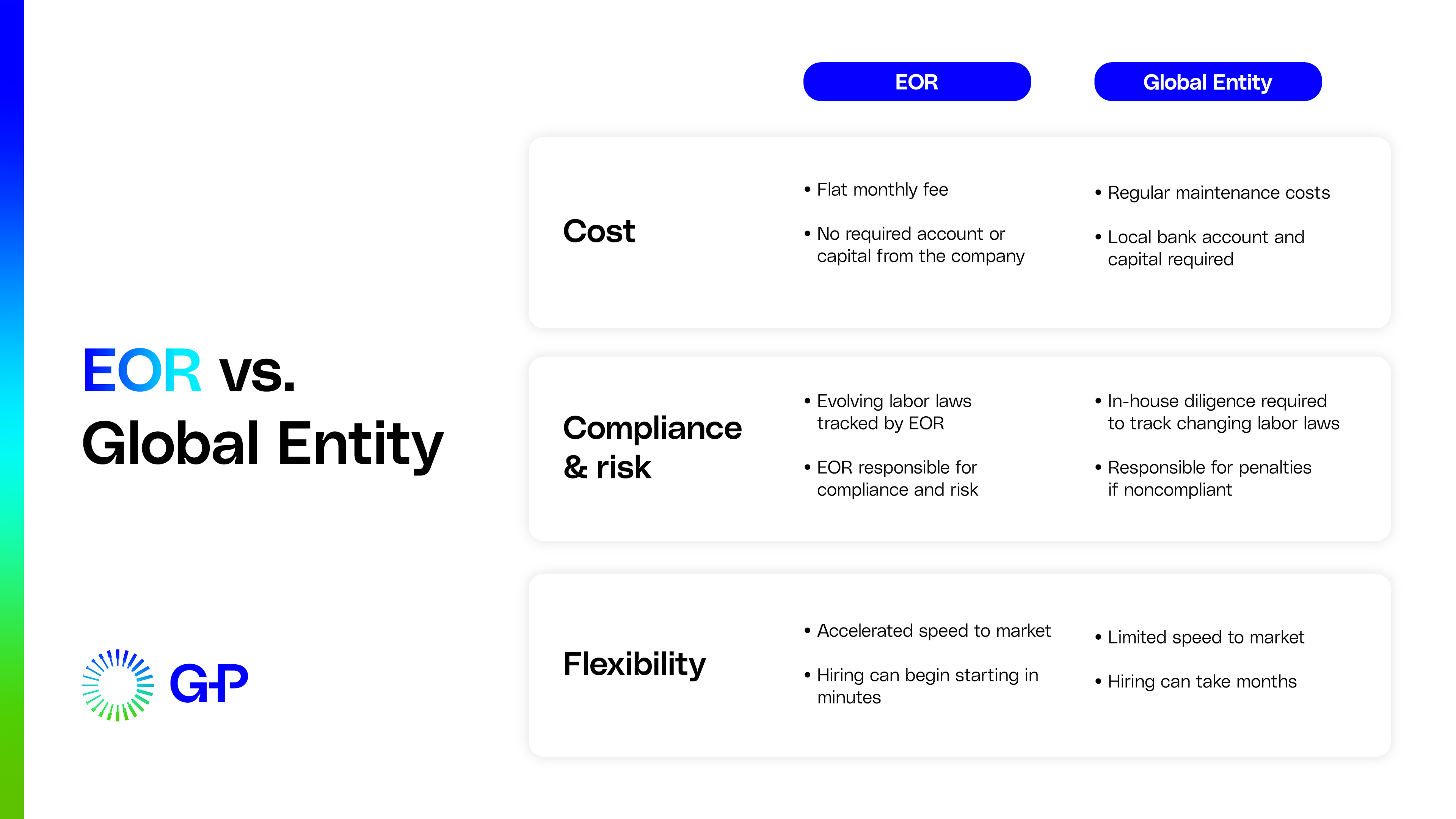W miarę jak coraz więcej firm zaczyna skupiać swoje strategie rozwoju na globalnej ekspansji i możliwościach związanych z budowaniem rozproszonych globalnie zespołów, pojawia się pytanie – jaki jest najlepszy sposób na wdrożenie tych planów?
Tradycyjnie standardowe podejście do globalnego zatrudniania polegało na ustanowieniu w kraju docelowym globalnego podmiotu, co stanowi znaczną inwestycję czasu i zasobów. Dziś jednak model pracodawcy formalnego (EOR) zaczął przewyższać ten tradycyjny model podmiotu globalnego, ponieważ oferuje wyjątkowe korzyści, takie jak szybkość i elastyczność wchodzenia na nowe rynki bez skumulowanego ryzyka i zaangażowania, jakie niesie za sobą założenie podmiotu globalnego. Dobra wiadomość jest taka, że w zależności od tego, który model będzie odpowiedni dla Twojej firmy, G-P oferuje usługi doradcze, które mogą Ci pomóc.
Ponieważ jest to pierwszy post w naszej serii „EOR vs. Global Entity”, przeanalizujemy różnice, wyzwania i możliwości, które oferują obie opcje, z spostrzeżeniami i poradami eksperta prawnego G-P, Kathryn Barnes.

Porównywanie kosztów pomiędzy pracodawcą formalnym a podmiotem globalnym
Na początek założenie podmiotu globalnego wiąże się z kosztami założenia spółki. Na przykład kilka krajów wymaga od firm wpłacenia kapitału na rachunek bankowy przed kontynuowaniem rejestracji spółki. Chociaż będzie się to różnić w zależności od kraju i innych czynników charakterystycznych dla firmy, 100 000według Barnesa koszt ten może wynieść ponad USD.
Co więcej, w wielu przypadkach pieniądze te muszą znajdować się na rachunku bankowym przez okres eksploatacji tego podmiotu globalnego. Załóżmy, że firma ma spaść poniżej tego 100 000 znacznika USD. W takim przypadku bank może zamknąć konto, co zniweluje zdolność firmy do prowadzenia działalności w tym kraju.
Chociaż założenie podmiotu globalnego jest kosztowne, zarządzanie nim wiąże się również z ceną. Typowe koszty eksploatacji obejmują ubezpieczenie, licencje, pensje i podatki od osób prawnych – wszystkie kluczowe transakcje w nieustannie utrzymującej się grze zgodnej z przepisami. Przerwa w tworzeniu podmiotu globalnego może znacznie obciążać zespoły, co również powinno być uznane za potencjalny koszt. Pracownicy są często zmuszeni do zarezerwowania całego czasu i energii na przezwyciężenie biurokratycznych zawiłości związanych z założeniem podmiotu, zamiast skupiać się na swoich codziennych obowiązkach.
Z kolei pracodawcy formalni zazwyczaj otrzymują stałą miesięczną opłatę, która zapewnia spójne koszty zgodności dla każdego kraju i zwalnia zespoły wewnętrzne z odpowiedzialności za nadążanie za zawiłościami prawnymi, takimi jak pozostawanie na bieżąco z różnymi krajowymi przepisami prawa pracy, które często zmieniają się z czasem.
Zrozumienie zgodności i ryzyka podczas globalnej działalności
Dział ds. zgodności z przepisami może opracować lub złamać plany ekspansji globalnej, dlatego niezwykle ważne jest, aby rozwijające się firmy były gotowe na przyjęcie złożonego i ciągłego krajobrazu międzynarodowych przepisów i regulacji.
Stale zmieniające się przepisy prawa pracy stanowią istotny środek odstraszający udaną globalną obsługę jednostek. Na przykład Barnes podkreślił, że niektóre kraje dostosowały swoje przepisy, aby narzucały, że międzynarodowi dyrektorzy firmy nie mogą już dłużej zgodnie z prawem prowadzić działalności. Oznacza to, że wymagany jest teraz dyrektor krajowy, którego nie wszystkie firmy mogą przyjąć.
Rządy są staranne, jeśli chodzi o zapewnienie zgodności ze wszystkimi lokalnymi firmami. Mogą nałożyć na Ciebie karę grzywny, powstrzymać Cię od prowadzenia działalności lub wstrzymać Cię od zatrudniania, aż do momentu, gdy będziesz w stanie pokazać, że Twoje działania w ich kraju są zgodne z prawem.
Nie wspominając o tym, że prawo pracy składa się z przepisów rządowych i prawa sądowego. Jedna z nich może wyprzedzić drugą, wymagając od firm szybkiego reagowania i dostosowania się do nowych przepisów. Na przykład Barnes zauważył, że Niemcy doradziły firmom, aby w roku spodziewały się zmian w 30 prawie pracy2024. Nie ma gwarancji, że w ciągu najbliższych 12 miesięcy nie zostaną wprowadzone ani zmienione dodatkowe przepisy oprócz oczekiwanych.
Oznacza to, że firmy stosujące podejście podmiotu do zarządzania swoją globalną działalnością będą musiały współpracować ze stronami trzecimi lub stworzyć własne zasoby prawne i kadrowe oraz wiedzę specjalistyczną, aby zapewnić zgodność z każdą działalnością biznesową i zadaniem, które wykonują, przy jednoczesnym ryzyku grzywien lub kar wynikających z niezgodności.
Z drugiej strony współpraca z pracodawcą formalnym oferuje kolejną ścieżkę zgodności. Jako legalny pracodawca Twojego zespołu, Twój partner formalny przejmuje złożone zadania regulacyjne, a następnie konsekwencje finansowe, które im towarzyszą. Jest to korzystne na dwa sposoby: pomaganie w zapewnieniu ciągłej globalnej zgodności z przepisami, a także ograniczanie ryzyka.
Dostrzeganie większej elastyczności zapewnianej przez pracodawcę formalnego
Firmy potrzebują elastyczności, aby odnieść sukces na nowym rynku, co jest kolejną kluczową różnicą między tymi dwoma podejściami. Wiele zmiennych regulacyjnych może wydłużyć proces zakładania podmiotu bez względu na to, ile badań jest przeprowadzanych lub jakie rady są otrzymywane z wyprzedzeniem. Uwzględniając ten bufor, firmy mogą wygodnie radzić sobie z potencjalnymi opóźnieniami, takimi jak problemy bankowe lub zgłoszenia podatkowe. Na przykład w niektórych krajach założenie konta bankowego może zająć nawet 15 miesięcy, ostrzegał Barnes.
Opóźnienia te mogą mieć wpływ na globalny sukces wielu firm, ponieważ szybkość rynku ma kluczowe znaczenie dla budowania świadomości marki i tworzy fundament dla długoterminowego rozwoju. Ukończenie tego ponadrocznego procesu konfiguracji podczas poruszania się po biurokratycznej biurokratycznej biurokracji może skrócić czas i zmniejszyć kluczowe zasoby. W tym miejscu współpraca z pracodawcą formalnym staje się przewagą.
Dostawca usług pracodawcy formalnego wykonał już prace legginsowe i jest zaznajomiony z lokalnym krajobrazem, zdobywając wyjątkowe doświadczenie. Testując nowy rynek, dostawcy wysokiej jakości usług pracodawcy formalnego są w stanie doradzać firmom i kierować je w stronę niewykorzystanych, przeoczonych możliwości biznesowych. Po określeniu lokalizacji docelowej Twoja firma może szybko rozpocząć zatrudnianie za pośrednictwem pracodawcy formalnego. Partner pracodawcy formalnego o trwałości i jakości G-P może na przykład umożliwić firmom rozpoczęcie zatrudniania na nowym rynku w ciągu kilku minut. Wejście do tych nowych możliwości rynkowych lub wyjście z nich pozwala Twojej firmie szybciej osiągać sukcesy. Natomiast założenie własnej globalnej jednostki może zająć miesiące, jednocześnie blokując Cię na rynkach, które mogą nie spełniać Twoich celów.
Jak G-P może wspierać właściwy model dla Twojej globalnej firmy
Co więcej, ważne jest, aby firmy zdały sobie sprawę, że mają opcje przy wyborze sposobu budowania globalnych zespołów i ekspansji na nowe rynki. Nowsze firmy mogą od razu zauważyć zalety modelu pracodawcy formalnego, podczas gdy firmy o ugruntowanej pozycji mogą zacząć ponownie analizować swoje globalne strategie podmiotów, ponieważ zdają sobie sprawę z wielu korzyści, jakie może zaoferować przekształcenie zarządzania podmiotami w model pracodawcy formalnego. Niezależnie od tego, która ścieżka jest odpowiednia dla Twojej firmy, istnieje wiele zmiennych, z którymi należy się obchodzić bardzo ostrożnie.
Dlatego G-P oferuje rosnącą gamę usług doradczych G-P ─ dając klientom jeden punkt kontaktu w zakresie informacji związanych z globalnym rozwojem i dostępem do naszych ekspertów kadrowych i prawnych. Dzięki lokalnej wiedzy, gdy jej potrzebujesz, czas i zasoby potrzebne do badania i pokonania wyzwań związanych z globalną ekspansją są znacznie zmniejszone. Zmniejsza również ryzyko błędów w przestrzeganiu przepisów, gdy próbuje się to zrobić samodzielnie.
Dzięki G-P jako globalnemu pracodawcy formalnemu możesz zostawić nam zawiłości kadrowe i prawne, aby skupić się na rozwoju swoich zespołów. Jesteśmy tu również po to, aby pomóc nam dzielić się naszą wiedzą specjalistyczną w zakresie wsparcia istniejącego zarządzania podmiotami.
Skontaktuj się z nami już dziś, aby dowiedzieć się, jak usługi doradcze G-P mogą pomóc Twojej firmie.











